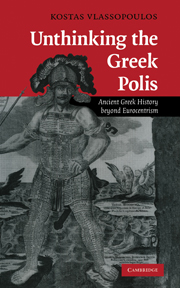Book contents
- Frontmatter
- Contents
- Acknowledgements
- Abbreviations
- Introduction
- PART I DEFINING THE CONTEXTS OF THINKING ABOUT THE POLIS
- PART II RETHINKING THE CONTEXTS. THE POLIS AS AN ENTITY: A CRITIQUE
- PART III BEYOND THE POLIS: THE POLIS AS PART OF A SYSTÈME-MONDE
- 6 The polis as a unit of analysis: poleis and koinôniai
- 7 Poleis and space
- 8 Poleis and polities
- 9 Poleis and time
- 10 Towards new master narratives of Greek history?
- References
- Index
6 - The polis as a unit of analysis: poleis and koinôniai
Published online by Cambridge University Press: 22 September 2009
- Frontmatter
- Contents
- Acknowledgements
- Abbreviations
- Introduction
- PART I DEFINING THE CONTEXTS OF THINKING ABOUT THE POLIS
- PART II RETHINKING THE CONTEXTS. THE POLIS AS AN ENTITY: A CRITIQUE
- PART III BEYOND THE POLIS: THE POLIS AS PART OF A SYSTÈME-MONDE
- 6 The polis as a unit of analysis: poleis and koinôniai
- 7 Poleis and space
- 8 Poleis and polities
- 9 Poleis and time
- 10 Towards new master narratives of Greek history?
- References
- Index
Summary
It has been a commonplace that societies, states and cultures are the units of analysis that historians have to use. I will restrict myself to the treatment of the notion of society in this context. Since the nineteenth century, it has been accepted wisdom that societies are distinct entities with their own rules, laws and borders, and they are the units of analysis that historians use. One could study the relations or interactions between different societies, but one still studies relations and interactions between distinct and definable entities. Is this view justified? I believe not, and in fact it has had a very pernicious influence on the study of Greek history. We hear about the contrast between aristocracy and the polis; between polis and the ethnos; between the citizen-hoplite and the mercenary; between Greece and the East. These distinctions emanate from a static and internalist view of society. I want then to pose two distinct yet interrelated questions: can we speak of the polis as a kind of society? And is the polis an adequate framework for the analysis of the social history of ancient Greek communities?
What is ancient Greek society then? Let us accept for a moment the usual view that a society is coterminous with the boundaries of a polity. What is Athenian society? Is it the society of the Athenian polis? There are reasons to doubt it.
- Type
- Chapter
- Information
- Unthinking the Greek PolisAncient Greek History beyond Eurocentrism, pp. 147 - 155Publisher: Cambridge University PressPrint publication year: 2007



